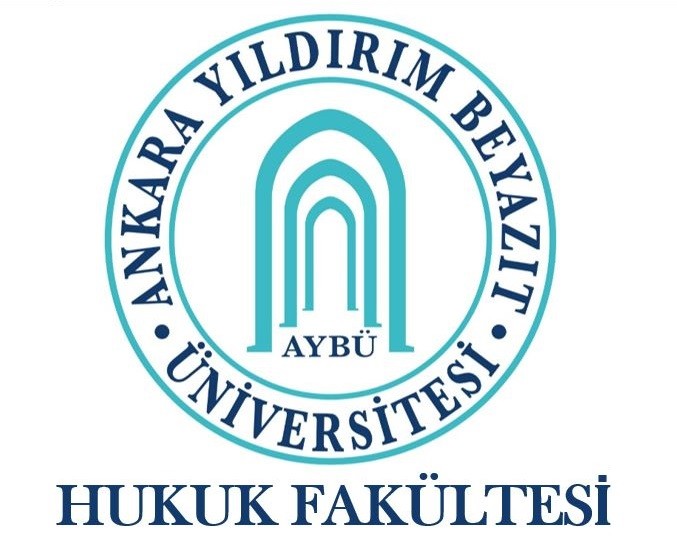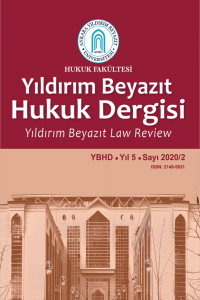Abstract
Ekonominin istikrarı için faiz politikalarının devletler tarafından belirlenmesi ve sürecin yalnızca devletin kontrolünde olması gerektiğinden ve bireyin içinde bulunduğu zor durumdan yararlanmak suretiyle yüksek faizli ödünç para verilmesi, bireyin içerisinden çıkamayacağı derinlikte ekonomik zorluğa düşmesine sebebiyet verebileceğinden dolayı kazanç karşılığı borç para verilmesi ancak devlet kontrolünde ve devletin izin verdiği kuruluşlar tarafından yapılabileceği kabul edilmektedir. Devletin izni dışında faizle ödünç para verilmesi ise, tefecilik suçunu oluşturmaktadır.
Hukukumuza ilk olarak 1933 tarihli 2279 sayılı Ödünç Para Verme İşleri Kanununun 17. maddesiyle yürürlüğe girmiş olan tefecilik suçu, günümüzde 5237 sayılı Türk Ceza Kanunu’nun 241. maddesinde, “kazanç karşılığı ödünç para vermek” şeklinde tanımlanmıştır. Bu çalışmada TCK’nun 241. maddesinde yer alan tefecilik suçunun tüm yönleriyle incelenmiş, tartışmalı ve problemli alanlara yönelik çözüm önerileri getirilmeye çalışılmıştır.
References
- Aksoy, Ömer Cem (2016) “Türkiye’de Çek Takası ve Çek Takası Verileri Işığında Çek Kullanımının İncelenmesi” (Uzmanlık Yeterlilik), Türkiye Cumhuriyet Merkez Bankası Ödeme Sistemleri Genel Müdürlüğü.
- Arslan, Çetin (2014) “Tefecilik Suçu”, Ankara Barosu Dergisi, S:1, (23-48)
- Balz, Burkhard (2019) “Krypto-TokenausSichteinesZentralbankers”, Central For Financial Studies (CFS) Konferenz, 08.05.2019, https://www.bundesbank.de/de/presse/reden/kryptotoken-aus-sicht-eines-zentralbankers-796396, s.e.t. 28.01.2020
- Baytaz, Abdullah Batuhan (2009) “Türk Ceza Hukukunda Müsadere (TCK md. 54-55)”, (Yüksek Lisans) Marmara Üniversitesi Sosyal Bilimler Enstitüsü
- Baytaz, Abdullah Batuhan (2018) Kanunilik İlkesi Bağlamında Ceza ve Ceza Muhakemesi Hukukunda Yorum, İstanbul, Oniki Levha Yayıncılık
- Bekar, Elif (2013) “Tefecilik Suçu”, İÜHFM, Cilt LXXI, Sayı 2, Yıl 2013 (499-526)
- Bilge, Burak (2015) “Gelişen Teknolojinin Doğurduğu Yeni Bir Suç Türü: Kredi Kartı (Pos) Tefeciliği”, İnönü Üniversitesi Hukuk Fakültesi Dergisi, Özel Sayı C:1, (481-520)
- Bozkurt Yüksel, Armağan Ebru (2015) “Elektronik Para, Sanal Para, Bitcoin ve Linden Doları’na Hukuki Bir Bakış”, İÜHFM, C: LXXIII, S:2 (173-220)
- Çarkacıoğlu, Abdurrahman (2016) Kripto-Para Bitcoin, Araştırma Raporu, Sermeya Piyasası Kurumu Araştırma Dairesi, Ankara
- Çavuşoğu, Cenk (2015) “Elektronik Paranın Gelişimi ve Merkez Bankası Bilançosu ile Para Politikası Uygulamaları Üzerine Etkisi”, (Uzmanlık Yeterlilik), Türkiye Cumhuriyet Merkez Bankası Muhasebe Genel Müdürlüğü European Central Bank, Virtual currencyschemes – a furtheranalysis, February 2015, s. 4
- https://www.ecb.europa.eu/pub/pdf/other/virtualcurrencyschemesen.pdf, s.e.t. 28.01.2020
- Giyik, Abdulbaki (2014) “Türk Hukukunda Tefecilik Suçu”, (Yüksek Lisans) Erciyes Üniversitesi Sosyal Bilimler Enstitüsü.
- Gün Tayfun (2019)”Türk Ceza Kanununda Tefecilik Suçu”, Gazi Üniversitesi Sosyal Bilimler Enstitüsü, Yayımlanmamış Yüksek Lisans Tezi, Ankara, 2019.
- Hançerlioğlu, Orhan (1981) Ekonomi Sözlüğü, 5. Bası, İstanbul, Remzi Kitapevi https://www.bundesbank.de/resource/blob/743056/5f5b83a30255dda9c6ba5faf21a48b2b/ mL/2017-11-23-thiele-ifo-pdf-data.pdf, s.e.t. 28.01.2020
- İçel, Kayıhan (2008) “Görünüşte Birleşme (İçtima) İlkeleri ve Yeni Türk Ceza Kanunu”, İstanbul Ticaret Üniversitesi Hukuk Fakültesi Dergisi, Y: 7, S:14, (35-49).
- Karakehya, Hakan (2013) “Türkiye’de Giderek Artan Hukuka Aykırı Bir Ekonomik Faaliyet Olarak Kredi Kartı Kullanılması Suretiyle Tefecilik” International Conference on EurasainEconomies, 2013, http://avekon.org/papers/731.pdf., 08.07.2020
- Katoğlu Tuğrul (2012) “Ceza Hukukunda Suçun Mağduru Kavramının Sınırları”, AÜHFD, Cilt 61, Sayı 2, Yıl 2012, (657-693)
- Meran, Necati (2011) Tefecilik Ekonomi Sanayi ve Ticarete İlişkin Suçlar, Ankara, Seçkin Yayınevi.
- Özbek, Veli Özer (2010) “Tefecilik Suçu (TCK m.241)”, CHD, S:14, (29- 39)
- Özbek, Veli Özer/Doğan, Koray/Bacaksız, Pınar/Tepe İlker (2016) Ceza Özel Hükümler, 10. Bası, Seçkin Yayıncılık, Ankara, 2016
- Özgenç, İzzet (2010) “Tefecilik Suçu”, Gazi Üniversitesi Hukuku Fakültesi Dergisi, C: XIV, S: 1
- The Law Library of Congress, Global Legal Research Center, Regulation of CryptocurrencyAround the World, https://www.loc.gov/law/help/cryptocurrency/cryptocurrency-worldsurvey.pdf, s.e.t. 27.01.2020.
- Thiele, Carl-Ludwig/ Diehli, Martin (2017) Kryptowährung Bitcoin: Währungswettbewerb oder Spekulationsobjekt: WelcheKonsequenzensindfürdasaktuelleGeldsystem zu erwarten?, ifoSchnelldienstZeitschrift, 22/2017, 70. Jahrgang, (3-6)
- Uğur, Hüsamettin (2007) “Tefecilik Suçunun Pozitif Dayanakları, Unsurları ve Uygulama İlkeleri”, Terazi Aylık Hukuk, Dergisi, S:8
- Üzer, Betül, (2017) “Sanal Para Birimleri”, (Uzmanlık Yeterlik), Türkiye Cumhuriyet Merkez Bankası Ödeme Sistemleri Genel Müdürlüğü.
- Yaşar Osman/Gökcan, Hasan Tahsin/Artuç, Mustafa (2014) Yorumlu-Uygulamalı Türk Ceza Kanunu, 5. Cilt (md 197-251), 2. Bası, Ankara Adalet Yayınevi.
- Yenidünya, Caner (2013) “Tefecilik Suçu (TCK.m.241)” Banka ve Finans Hukuku Dergisi Cilt:2, Sayı: 6, Yıl:2013 (3-29).
- https://blog.chainalysis.com/reports/cryptocurrency-crime-2020-report, s.e.t. 03.02.2020
- https://www.bddk.org.tr/Sss-Kategori/Odeme-Sistemleri-ve-Elektronik-Para-Kuruluslari/3, 26.01.2020
- http://www.mahfiegilmez.com/2019/11/piyasada-ne-kadar-nakit-para-var.html, s.e.t. 29.01.2020
- https://www.reuters.com/article/us-crypto-currencies-marshall-islands/marshall-islands-toissue-own-sovereign-cryptocurrency-idUSKCN1GC2UD, s.e.t. 28.01.2020
Abstract
For the stability of the economy, interest policies should be determined by the states and the process should be controlled only by the state. Lending high-interest loans by taking advantage of the difficult situation of the person is in may cause the person to fall into economic difficulty at a depth that he cannot get out of. Therefore, Lending money in order to earn interest should only be under the control of the state. For this reason, lending money with interest without the government's permission constitutes usury crimes.
Usury crime first came into force with the Law on Loaning Loan Affairs Law No. 2279, which is regulated in 1933 and it was applied until the Turkish Penal Code No. 5237 went into effect in 2005. Subsequently, the crime of usury, which is regulated in Article 241 of the Turkish Penal Code No. 5237, is means as lending to someone else in order to earn a profit. In this study, all aspects of usury crime in Article 241 of Turkih Penal Code have been examined and solutions have been tried to be put forward for controversial and problematic areas.
Keywords
References
- Aksoy, Ömer Cem (2016) “Türkiye’de Çek Takası ve Çek Takası Verileri Işığında Çek Kullanımının İncelenmesi” (Uzmanlık Yeterlilik), Türkiye Cumhuriyet Merkez Bankası Ödeme Sistemleri Genel Müdürlüğü.
- Arslan, Çetin (2014) “Tefecilik Suçu”, Ankara Barosu Dergisi, S:1, (23-48)
- Balz, Burkhard (2019) “Krypto-TokenausSichteinesZentralbankers”, Central For Financial Studies (CFS) Konferenz, 08.05.2019, https://www.bundesbank.de/de/presse/reden/kryptotoken-aus-sicht-eines-zentralbankers-796396, s.e.t. 28.01.2020
- Baytaz, Abdullah Batuhan (2009) “Türk Ceza Hukukunda Müsadere (TCK md. 54-55)”, (Yüksek Lisans) Marmara Üniversitesi Sosyal Bilimler Enstitüsü
- Baytaz, Abdullah Batuhan (2018) Kanunilik İlkesi Bağlamında Ceza ve Ceza Muhakemesi Hukukunda Yorum, İstanbul, Oniki Levha Yayıncılık
- Bekar, Elif (2013) “Tefecilik Suçu”, İÜHFM, Cilt LXXI, Sayı 2, Yıl 2013 (499-526)
- Bilge, Burak (2015) “Gelişen Teknolojinin Doğurduğu Yeni Bir Suç Türü: Kredi Kartı (Pos) Tefeciliği”, İnönü Üniversitesi Hukuk Fakültesi Dergisi, Özel Sayı C:1, (481-520)
- Bozkurt Yüksel, Armağan Ebru (2015) “Elektronik Para, Sanal Para, Bitcoin ve Linden Doları’na Hukuki Bir Bakış”, İÜHFM, C: LXXIII, S:2 (173-220)
- Çarkacıoğlu, Abdurrahman (2016) Kripto-Para Bitcoin, Araştırma Raporu, Sermeya Piyasası Kurumu Araştırma Dairesi, Ankara
- Çavuşoğu, Cenk (2015) “Elektronik Paranın Gelişimi ve Merkez Bankası Bilançosu ile Para Politikası Uygulamaları Üzerine Etkisi”, (Uzmanlık Yeterlilik), Türkiye Cumhuriyet Merkez Bankası Muhasebe Genel Müdürlüğü European Central Bank, Virtual currencyschemes – a furtheranalysis, February 2015, s. 4
- https://www.ecb.europa.eu/pub/pdf/other/virtualcurrencyschemesen.pdf, s.e.t. 28.01.2020
- Giyik, Abdulbaki (2014) “Türk Hukukunda Tefecilik Suçu”, (Yüksek Lisans) Erciyes Üniversitesi Sosyal Bilimler Enstitüsü.
- Gün Tayfun (2019)”Türk Ceza Kanununda Tefecilik Suçu”, Gazi Üniversitesi Sosyal Bilimler Enstitüsü, Yayımlanmamış Yüksek Lisans Tezi, Ankara, 2019.
- Hançerlioğlu, Orhan (1981) Ekonomi Sözlüğü, 5. Bası, İstanbul, Remzi Kitapevi https://www.bundesbank.de/resource/blob/743056/5f5b83a30255dda9c6ba5faf21a48b2b/ mL/2017-11-23-thiele-ifo-pdf-data.pdf, s.e.t. 28.01.2020
- İçel, Kayıhan (2008) “Görünüşte Birleşme (İçtima) İlkeleri ve Yeni Türk Ceza Kanunu”, İstanbul Ticaret Üniversitesi Hukuk Fakültesi Dergisi, Y: 7, S:14, (35-49).
- Karakehya, Hakan (2013) “Türkiye’de Giderek Artan Hukuka Aykırı Bir Ekonomik Faaliyet Olarak Kredi Kartı Kullanılması Suretiyle Tefecilik” International Conference on EurasainEconomies, 2013, http://avekon.org/papers/731.pdf., 08.07.2020
- Katoğlu Tuğrul (2012) “Ceza Hukukunda Suçun Mağduru Kavramının Sınırları”, AÜHFD, Cilt 61, Sayı 2, Yıl 2012, (657-693)
- Meran, Necati (2011) Tefecilik Ekonomi Sanayi ve Ticarete İlişkin Suçlar, Ankara, Seçkin Yayınevi.
- Özbek, Veli Özer (2010) “Tefecilik Suçu (TCK m.241)”, CHD, S:14, (29- 39)
- Özbek, Veli Özer/Doğan, Koray/Bacaksız, Pınar/Tepe İlker (2016) Ceza Özel Hükümler, 10. Bası, Seçkin Yayıncılık, Ankara, 2016
- Özgenç, İzzet (2010) “Tefecilik Suçu”, Gazi Üniversitesi Hukuku Fakültesi Dergisi, C: XIV, S: 1
- The Law Library of Congress, Global Legal Research Center, Regulation of CryptocurrencyAround the World, https://www.loc.gov/law/help/cryptocurrency/cryptocurrency-worldsurvey.pdf, s.e.t. 27.01.2020.
- Thiele, Carl-Ludwig/ Diehli, Martin (2017) Kryptowährung Bitcoin: Währungswettbewerb oder Spekulationsobjekt: WelcheKonsequenzensindfürdasaktuelleGeldsystem zu erwarten?, ifoSchnelldienstZeitschrift, 22/2017, 70. Jahrgang, (3-6)
- Uğur, Hüsamettin (2007) “Tefecilik Suçunun Pozitif Dayanakları, Unsurları ve Uygulama İlkeleri”, Terazi Aylık Hukuk, Dergisi, S:8
- Üzer, Betül, (2017) “Sanal Para Birimleri”, (Uzmanlık Yeterlik), Türkiye Cumhuriyet Merkez Bankası Ödeme Sistemleri Genel Müdürlüğü.
- Yaşar Osman/Gökcan, Hasan Tahsin/Artuç, Mustafa (2014) Yorumlu-Uygulamalı Türk Ceza Kanunu, 5. Cilt (md 197-251), 2. Bası, Ankara Adalet Yayınevi.
- Yenidünya, Caner (2013) “Tefecilik Suçu (TCK.m.241)” Banka ve Finans Hukuku Dergisi Cilt:2, Sayı: 6, Yıl:2013 (3-29).
- https://blog.chainalysis.com/reports/cryptocurrency-crime-2020-report, s.e.t. 03.02.2020
- https://www.bddk.org.tr/Sss-Kategori/Odeme-Sistemleri-ve-Elektronik-Para-Kuruluslari/3, 26.01.2020
- http://www.mahfiegilmez.com/2019/11/piyasada-ne-kadar-nakit-para-var.html, s.e.t. 29.01.2020
- https://www.reuters.com/article/us-crypto-currencies-marshall-islands/marshall-islands-toissue-own-sovereign-cryptocurrency-idUSKCN1GC2UD, s.e.t. 28.01.2020
Details
| Primary Language | Turkish |
|---|---|
| Subjects | Law in Context |
| Journal Section | PUBLIC LAW |
| Authors | |
| Publication Date | July 29, 2020 |
| Published in Issue | Year 2020 Issue: 2 |
Cite
Cited By
TÜRK CEZA HUKUKUNDA TEFECİLİK SUÇU
Ankara Sosyal Bilimler Üniversitesi Hukuk Fakültesi Dergisi
https://doi.org/10.47136/asbuhfd.938918
"TEFECİLİK" SUÇU (TCK m. 241) AÇISINDAN GRUP İÇİ ÖDÜNÇ İŞLEMLERİ
Ticaret ve Fikri Mülkiyet Hukuku Dergisi
https://doi.org/10.55027/tfm.1101742



